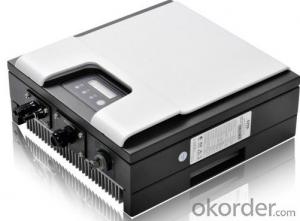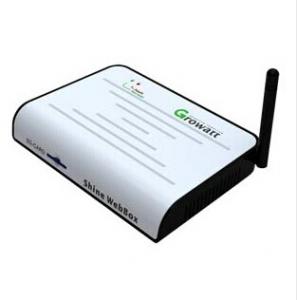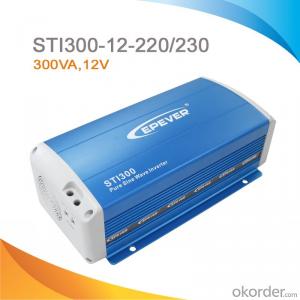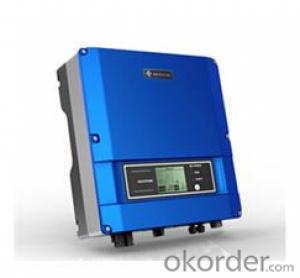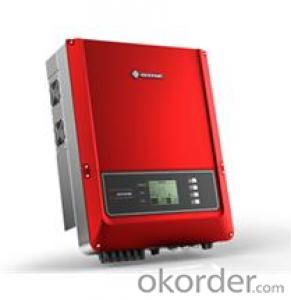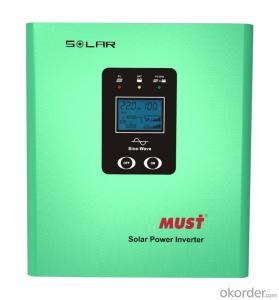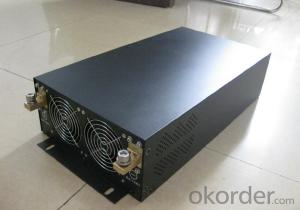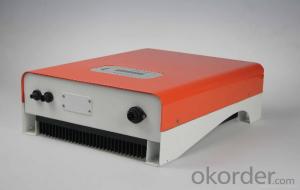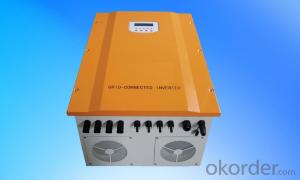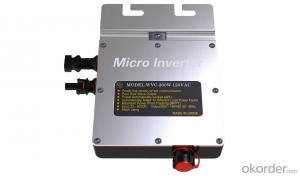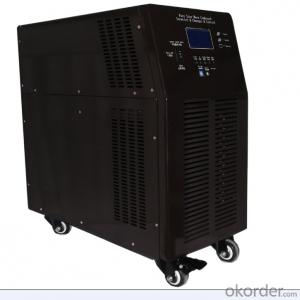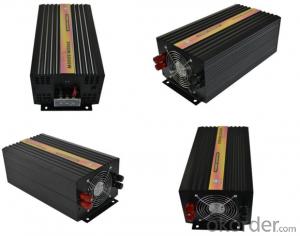Solar Inverter Igbt - Three Phase Inverter Second Generation 5k Solar Inverter Made in China
- Loading Port:
- Shanghai
- Payment Terms:
- TT OR LC
- Min Order Qty:
- 0 watt
- Supply Capability:
- 10000 watt/month
OKorder Service Pledge
OKorder Financial Service
You Might Also Like
Description of Three Phase Inverter Second Generation 5k Solar Inverter
Solar ac power system consists of solar panels, charge controllers, inverter and battery; Solar energy does not include inverter dc power system. Inverter is a kind of power conversion device, inverter by incentives can be divided into self-excited oscillation inverter and separately excited oscillation inverter.
Features of Three Phase Inverter Second Generation 5k Solar Inverter
Standard 10 years warranty, 5-15 years optional
Built-in Gprs as option
Built-in Wifi as option
Smaller and lighter, only 18kg
High performance DSP for algorithm control
VDE-AR-N 4105 certification
New topology design
Dual MPPT design
Multi-button touch interface
LCD screen visible at night
Have anti-shading function
Advantages of Three Phase Inverter Second Generation 5k Solar Inverter
Longer life cycle
Plug and play
Free monitoring through our webportal
Very lower internal temperature
Easy transportation and installation
Faster CPU speed
Adjustable active and reactive power
Maximum conversion effciency up to 98.3%,Euro up to 97.7%
More flexible system design
User friendly operation
Technical Data of Three Phase Inverter Second Generation 5k Solar Inverter
| Type | Omniksol-5k-TL2-TH |
| Input(DC) | |
| Max.PV Power | 5200W |
| Max,DC Voltage | 1000V |
| Nominal DC Voltage | 640V |
| Operating MPPT Voltage Range | 150-800V |
| MPPT Voltage Range at Nominal Power | 200-800V |
| Start up DC Voltage | 180V |
| Turn off DC Voltage | 150V |
| Max, DC Current(A/B) | 11A/11A |
| Max, Short Cicuit Current for each MPPT | 16A/16A |
| Number of MPP trackers | 2 |
| Number of DC Connection | A:2/B:2 |
| DC Connection Type | MC4 connector |
| Output(AC) | |
| Max,AC Apparent Power | 5000VA |
| Nominal AC Power (cos phi = 1) | 5000W |
| Nominal Grid Voltage | 220V/230V/240V |
| Nominal Grid Frequency | 50Hz/60Hz |
| Max, AC Current | 7.6A |
| Grid Voltage Range** | 185-276V |
| Grid Frequency Range** | 45-55Hz/55-65Hz |
| Power Factor | 0.9 capacitive... 0.9 inductive |
| Total Harmonic Distortion(THD) | <2% |
| Feed in Starting Power | 30W |
| Night time Power Consumption | <1W |
| Standby Consumption | <10W |
| AC Connection Type | Plug-in connertor |
| Efficiency | |
| Max,Efficiency | 98.2% |
| Euro Efficiency | 97.5% |
| MPPT Efficiency | 99.9% |
| Safety and Protection | |
| DC Insulation Monitoring | Yes |
| DC Switch | Optional |
| Residual Current Monitoring Unit (RCMU) | Integrated |
| Grid Monitoring with Anti-islanding | Yes |
| Electricity Fuse Protection | Yes |
| Protection Class | Ⅰ(According to IEC 62103) |
| Overvoltage Category | PVⅡ/Mains Ⅲ(According to IEC 62109-1) |
| Reference Standard | |
| Safety Standard | EN 62109, AS/NZS 3100 |
| EMC Standard | EN 6100-6-1, EN 6100-6-2, EN 6100-6-3 EN 6100-6-4, EN 6100-3-2, EN 6100-3-3 |
| Grid Standard | VDE-AR-N4105. VDE-0126-1-1,G83/1,EN 50438,RD1699,CEI 0-21, AS4777,C10/C11 |
| Physical Structure | |
| Dimensions | 352x421x154.5mm |
| Weight | 18kg |
| Environmental Protection Rating | IP 65 (According to IEC 60529) |
| Cooling Concept | Natural convection |
| Mounting Information | Wall bracket |
| General Data | |
| Operating Temperature Range | -25℃ to +60℃(derating above 45℃) |
| Relative Humidity | 0% to 98%, no condensation |
| Max. Altitude (above sea level) | 2000m |
| Noise Type | <40dB |
| Isolation Type | Transformerless |
| Display | 20 x 4 LCD (800x480 TFT Graphic Display optional) |
| Data Communication | RS485(WiFi, GRPS optional) |
| Computer Communication | USB |
| Standard Warranty | 10 Years (5-15 years optional) |
IMages of Three Phase Inverter Second Generation 5k Solar Inverter
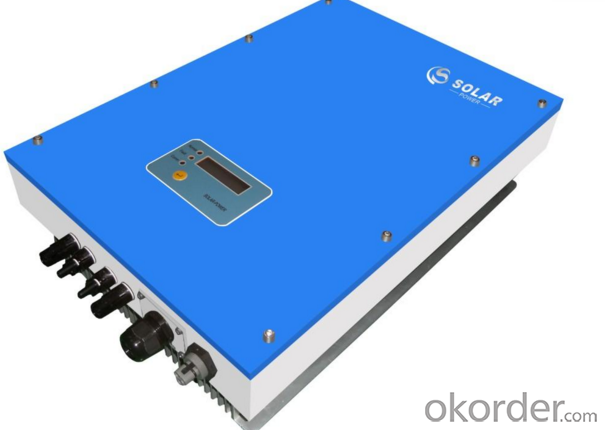
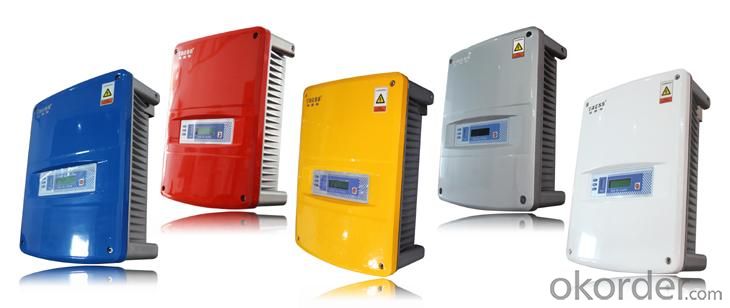
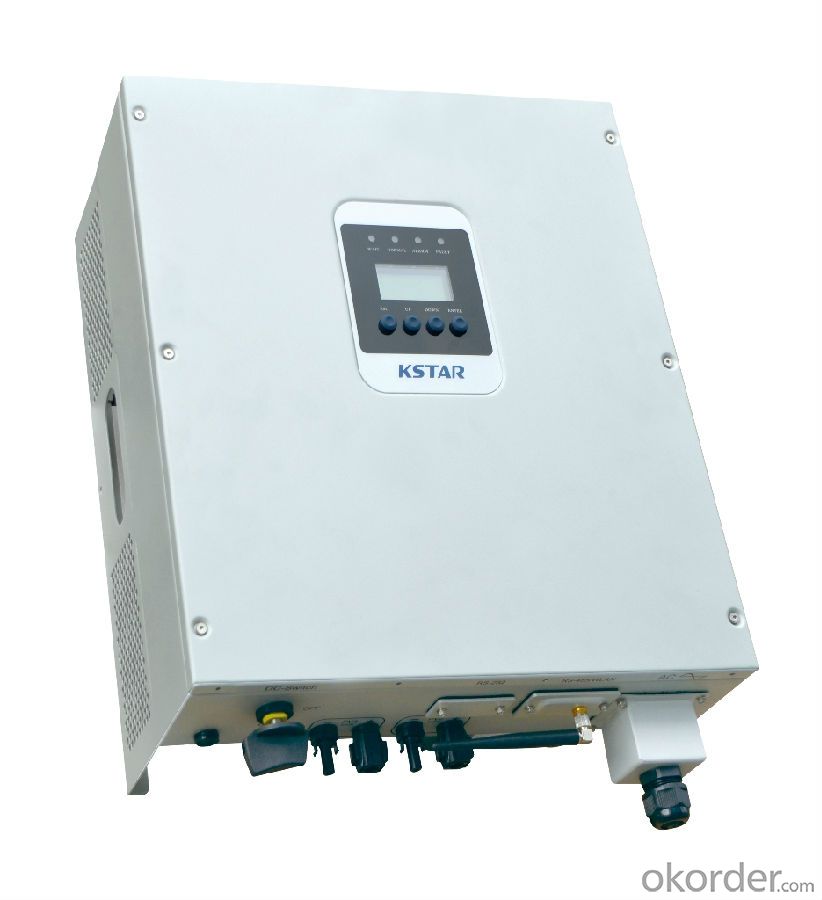
FAQ
Q: Do you have the CE, TUV, UL Certification?
A: We’ve already passed all the tests, and any certificate is available.
Q: Have you ever sold your products to companies in my country?
A: Of course, we have customers in all general PV markets, but I think we should expand our market share along with the market growth.
Q: When did your company set up? You are a new company, how can I believe your quality?
A: We entered into Solar PV industry in 2005, now we have several plants in manufacturing of a-Si and c-Si panels, and our capacity is 220MW per year. Till now we have already passed all the tests by authorized laboratories, e.g. TUV, CE, UL.
Q: Can you help us install the module if we cooperate with you?
A: We haven’t entered into installation sector, but we have the plan in near future.
Q: How do you pack your products?
A: We have rich experience on how to pack the panels to make sure the safety on shipment when it arrives at the destination.
Q: Can you do OEM for us?
A: Yes, we can.
Q: Can we visit your factory?
A: Surely, I will arrange the trip basing on your business schedule.
- Q: What is the purpose of a solar inverter in a solar power system?
- The purpose of a solar inverter in a solar power system is to convert the direct current (DC) electricity produced by the solar panels into alternating current (AC) electricity that can be used to power electrical devices in homes and businesses.
- Q: Can a solar inverter be used in countries with different electrical standards?
- Yes, a solar inverter can be used in countries with different electrical standards by ensuring it is compatible with the specific electrical standards of the country. This may involve adjusting the voltage, frequency, and plug type to match the local requirements, or using voltage converters or adapters if necessary. It is important to consult with a professional or check the manufacturer's specifications to ensure proper compatibility and safe operation.
- Q: What is maximum power point tracking (MPPT) in a solar inverter?
- Maximum Power Point Tracking (MPPT) in a solar inverter is a technique used to optimize the energy output of a solar panel system by continuously tracking and adjusting the operating point of the panels to ensure they are operating at their maximum power point. This is achieved by dynamically adjusting the voltage and current levels to match the changing environmental conditions and load requirements, allowing the solar panels to produce the maximum amount of power available at any given time.
- Q: How does a solar inverter protect against lightning strikes?
- A solar inverter typically protects against lightning strikes by incorporating surge protection devices and grounding systems. These features help to divert the excess energy caused by a lightning strike away from the sensitive electronic components of the inverter, preventing damage and potential electrical hazards.
- Q: Can a solar inverter be used with different types of tracking algorithms?
- Yes, a solar inverter can be used with different types of tracking algorithms. The inverter is designed to convert the DC power generated by solar panels into usable AC power for various applications. The tracking algorithm, on the other hand, is responsible for optimizing the solar panel's orientation to maximize energy production. Different tracking algorithms like fixed tilt, single-axis, or dual-axis can be employed with the solar inverter to enhance energy harvesting based on factors such as sun's position, time of day, and weather conditions.
- Q: Can a solar inverter be used with solar concentrators?
- Yes, a solar inverter can be used with solar concentrators. Solar concentrators are designed to focus sunlight onto a smaller area, increasing its intensity. The concentrated sunlight is then converted into electricity by the solar panels and fed into the solar inverter, which converts the DC power generated by the panels into AC power suitable for use in homes or businesses. Therefore, solar concentrators and solar inverters can work together to maximize the efficiency and output of a solar energy system.
- Q: What is the role of a solar inverter in a solar-powered telecommunications system?
- The role of a solar inverter in a solar-powered telecommunications system is to convert the direct current (DC) produced by the solar panels into alternating current (AC) that can be used to power the telecommunications equipment. It also ensures that the AC power is stable and at the necessary voltage and frequency for the proper functioning of the system.
- Q: Can a solar inverter be used in a floating solar system?
- Yes, a solar inverter can be used in a floating solar system. The inverter is an essential component of a solar power system that converts the direct current (DC) generated by the solar panels into alternating current (AC) electricity that can be used to power various devices or be fed into the grid. Whether the solar panels are installed on the ground, rooftops, or floating platforms, the inverter's role remains the same. Therefore, it can certainly be used in a floating solar system to ensure efficient and reliable power conversion.
- Q: Are there any government incentives available for solar inverters?
- Yes, there are government incentives available for solar inverters. These incentives vary by country and region, but often include tax credits, grants, and rebates to encourage the adoption of solar energy. It is recommended to check with local authorities or consult a solar energy professional to determine the specific incentives available in a particular area.
- Q: How does a solar inverter handle partial shading on solar panels?
- A solar inverter handles partial shading on solar panels by utilizing a technique called Maximum Power Point Tracking (MPPT). MPPT allows the inverter to constantly monitor and adjust the voltage and current levels of each solar panel to ensure that it operates at its maximum power output despite shading. This is achieved by dynamically redistributing power between the shaded and unshaded panels, optimizing the overall energy generation of the entire solar array.
Send your message to us
Solar Inverter Igbt - Three Phase Inverter Second Generation 5k Solar Inverter Made in China
- Loading Port:
- Shanghai
- Payment Terms:
- TT OR LC
- Min Order Qty:
- 0 watt
- Supply Capability:
- 10000 watt/month
OKorder Service Pledge
OKorder Financial Service
Similar products
Hot products
Hot Searches
Related keywords
